*/
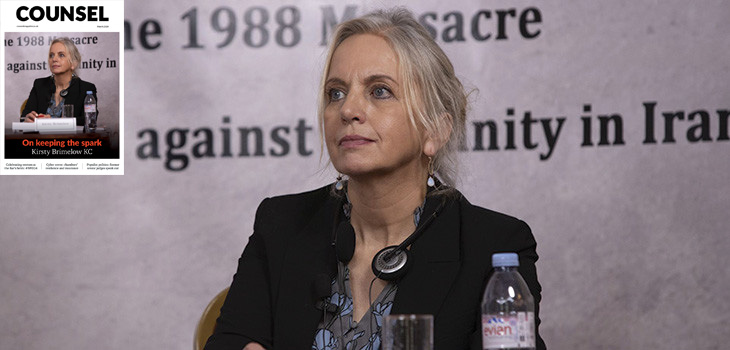
I used to balk at the idea of being on a ‘journey’. I still shy at its very concept, skittering into the undergrowth to avoid a road with signposts and crossroads. Perhaps if I mentally erase the road, I can poke at the body of my career at the Bar and throw out some thoughts from its tattered gown.
This leads me to the headline of being comfortable with who you are, with the sub-heading of lightly wearing badges of upbringing and remembering that they are reversible. My background is not one of financial privilege.
Both my parents started work at 15 years old. My dad worked on the factory floor as an apprentice in engineering. My mum worked as a sewist.
I remember one evening being given the responsibility of collecting her wages from her employer. I can recall the man through my eight-year-old eyes. He wore a thick gold chain and seemed to have a flash car. He told me he had deducted my mum’s wages as a zip was not straight. Zips were paid about 30 pence better than hems. It seemed a precious item. I remember looking at the neat stiches marching alongside the metal. There was no flaw. It all seemed unfair.
I probably absorbed a helplessness from my paternal grandmother whose hand was doubled back due to a botched hospital strapping of the wrist she broke as a child. In all our old photographs, she hides it under a coat. She was stung by her own perceived deformity. I listened to the stories of the poor health of my grandfathers from factories and mines. I saw how hard they worked.
I threw myself into petitioning against the clubbing of seals and harpooning of whales. I thought I could help the animals, if not the people.
Education was valued in our home as the shiny, clean steps into a profession. Career advice was limited to choices of medicine or law with a university degree spreading the sparkle. I read law at Birmingham University.
In my second year, I entered the Law Faculty Mooting Competition. The final was judged by Sir Stephen Brown LJ, former President of the Family Division and the winner was awarded by Lord Goff at a formal dinner. The competition was dominated by guys who oozed self-assurance, coated and dipped in a protective layer of class privilege. I felt my outsider shadow bouncing alongside me as I clutched the lectern. When I won, I was presented with a cup and a sprinkle of self-belief.
I remained drawn to those in vulnerable positions. Each year, a group of us fundraised and took deprived children from Inner City Birmingham, on holiday. The children were selected by social workers. They were wonderful and tragic, and our eyes glistened when we took them home, arranging to see them again.
Lancashire Local Authority provided my grant through university and through the Bar Course. Gray’s Inn awarded me a scholarship and the securing of a pupillage and grant at 2 Crown Office Row (now Lyttleton Chambers) meant that I was on my way to becoming a barrister.
I was called to the Bar in 1991 and, against all advice, deferred my pupillage for a year and strode out backpacking around the world, hustling, hitch-hiking and exploring countries whose existence I had only ever traced in photographs. I stocked up on Meatloaf cassettes from the street markets of Bangkok and sang along to ‘Heaven Can Wait’ while roaming like a bat out of hell.
In 1993, on completion of pupillage, I was offered tenancy at a small common law set of chambers. I had 18 enjoyable months as a tenant before the Head of Chambers left. Others followed and the chambers quickly and neatly folded. I became a squatter. I sucked the word of its negativity with my busy common law practice. I enjoyed catching the words of my opponent and dropping them onto my bonfire of their vanities. I usually was underestimated and experienced sexism and judicial bullying. I also found the friendships and support, from barristers, judges and solicitors that cushioned each fall. Above all, I was a successful lawyer.
One day, the prosecutor in my trial, Phillip Matthews (subsequently HHJ Matthews) suggested that I applied to his set of chambers, Francis Taylor Building. I did and was offered tenancy. It was another beginning, although there was no pause in my travelling. After around five years, the set decided that it wanted to change direction and stop criminal work. Not willing to give up on crime, a group of us moved together to 187 Fleet Street. In 2006, I spent two months in Jamaica working on the resentencing of people on death row. One prisoner proudly showed off a model that was made of matchsticks. I admired it while a neon light flickered, and a guard laughed.
Increasingly, I was working with barristers at Doughty Street Chambers. In 2009, Geoffrey Robertson KC, who was leading me at the time, suggested that I join Doughty Street. I did so after a meeting with an impressive barrister called Keir Starmer KC. I was sad to leave 187 but happy to keep the friendships.
I always wanted to add value and make change. I barrelled into Bar politics, protesting at the dismal levels of legal aid paid to juniors and setting up a representative body for the Young Bar. I became a young spokesperson for the Bar and for a decade would pop up on the small screen on chat shows and in print. I wrote my first media article for The Times and became one of its twice-yearly book reviewers. I was elected to the Criminal Bar Association (CBA) Executive for seven years and enjoyed drafting responses to consultations, analysing the additional crimes being added to the legislation jungle, while probation officers at court were strangled of resources.
In 2011, I was appointed silk. I telephoned my mum and we cried. My dad said that I had done well; a northern equivalent of performing cartwheels. The messages of congratulations from judges, barristers and solicitors sit alongside the mooting cup in the pockets of my mind.
I was elected to the Bar Human Rights Committee for 15 years and in 2012 was elected its first female Chair. I served for six years with an Executive that selflessly gave their time to intervene in unfair trials, write letters of concern over political prisoners and join my teams of barristers training UNICEF’s Child Protection Networks in child rights in Nigeria, evidence gathering on torture in Sri Lanka and fact finding in refugee camps.
I stitched travel and law together in my human rights practice and learnt new languages and dance around the edges. In Colombia, a fact-finding of extra-judicial killings shapeshifted into over a decade’s human rights work and conflict resolution.
San José de Apartadó peace community is a group of Cacao farmers who resisted displacement in 1997. On 21 February 2005, paramilitaries and the Colombian army collaborated to massacre the community’s leader and seven others, including three children. The community cut dialogue with the Colombian State and became emblematic of the suffering of the 52-year-old conflict. I met the community in 2012 and they agreed that I could open talks with the Colombian government over a Constitutional Court Order which had ordered reparations by the Colombian government.
I had a meeting with former President Santos on 29 November 2013 at the Presidential Palace in Bogotá. I requested a public apology for former President Uribe’s stigmatisation of the community immediately after the massacre. He had labelled them as FARC [Fuerzas Armadas Revolucionarias de Colombia]. President Santos apologised to the community on 10 December 2013. The words travelled to me as I was walking to defend in a gangland shooting trial at the Old Bailey: ‘I ask for forgiveness. And I do so with the knowledge that forgiveness is a condition for peace, and that peace is the only guarantor that there will be no more victims.’
In 2022 I was elected Chair of the CBA. My term as Chair commenced with implementing a ballot of a full walk-out of barristers from the courts. I stood alongside our juniors and silks outside the courts of Manchester, Liverpool, Preston, the Supreme Court and the High Court. It was a time of strength and stress and support, including from our solicitor colleagues.
I opened negotiations with former Lord Chancellor Brandon Lewis, working with others, and recommended a deal to the membership. On 10 October 2022, the CBA voted for the government’s offer of a 15% increase on backlog and commitment of an additional £7 million to other parts of the legal aid scheme during the spending review period. The impact assessment in 2023 placed the increase at 17%.
The vote was carried by juniors and seniors in fairly even number. Dominic Raab MP returned as Lord Chancellor just over two weeks later. He was clear that he would never have agreed to the deal. However, he agreed to honour it.
By May 2023, prosecution fees increases were implemented. We worked on increasing pay in the Magistrates’ Courts and increasing the use of Certificates for Assigned Advocates in the Youth Courts with success. Additional funding is coming into the Youth Courts in April 2024.
As the recent judicial review by the Law Society punches plain, the criminal justice system remains starved and neglected and the Criminal Legal Aid Advisory Board is required to do heavy lifting which can only succeed with additional money.
I left my position with another increase in train for s 28 recordings, which came into force in autumn 2023.
I hover over my time as Chair of the CBA as I continue to be asked about it daily in the robing rooms. Just before the opening of the ballot, many witnessed a toxic seam in the Criminal Bar. I also was handed buckets full of kindness from across the legal profession, which washed it away.
Criminal barristers made history through their action for the criminal justice system. It was successful with a smash and grab deal. When their action is taught and reflected on, they will inspire.
In 2021, I was appointed a Deputy High Court Judge and in 2022 I was appointed a Recorder. I am a Bencher of Gray’s Inn and have just completed three years on its management committee. I also am in my third year as trustee of the World Wildlife Fund; the seal pups were never very far away. In 2024, a typical day involves defending in a murder or terrorism trial, carrying out Child Rights training as a consultant to UNICEF in Myanmar, speaking on Parliamentary Select Committees and on panels on the crime of aggression in Ukraine or at the United Nations on accountability for the 1988 massacre in Iran. I remain a trainer and mentor for the Young Bar and represent Gray’s Inn on the Bar Council.
What Bar life learning can I share? It feels presumptuous, but maybe it is that we all stumble and fall and that this isn’t failure but is part of travel. Ask for help and remember those who are kind and pass it on. Keep the ladder down and the hand outstretched.
The profession is the barristers who weave words and law with skill underpinned with thoroughness and fairness. Where there is passion, it should not be overrun by ego. Keep intellectually curious and remember that preparation provides the depth to the spotlight.
Find what you love, find the people you love and look after them. Take advice but don’t let it paralyse you. Walk in the shoes of your clients and families but remember to kick off those shoes and not lose the core of yourself.
Criminal law and international human rights law will never provide the financial riches of those who work in commercial law or banks. However, there are opportunities to light fires that cast unfairness into the shadows. We just have to keep the spark.
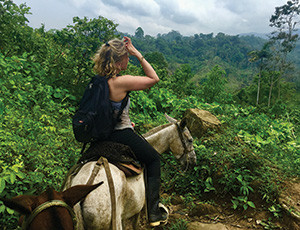
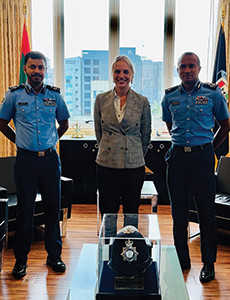
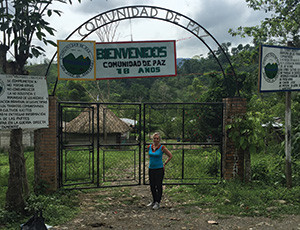
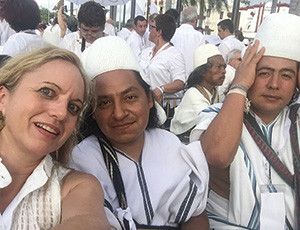
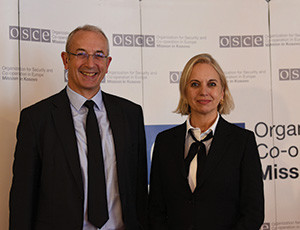
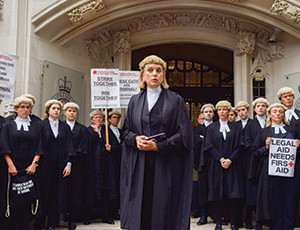
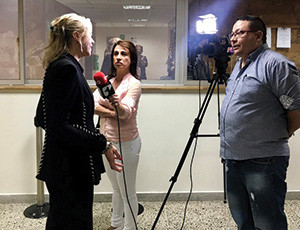
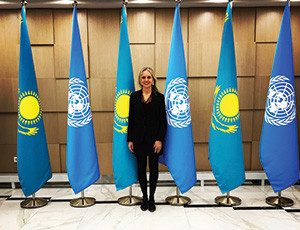
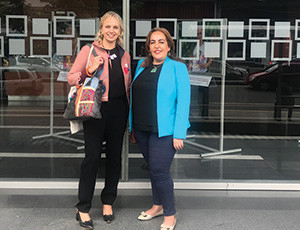
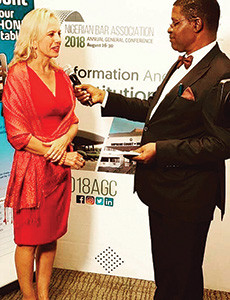
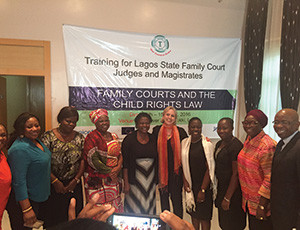
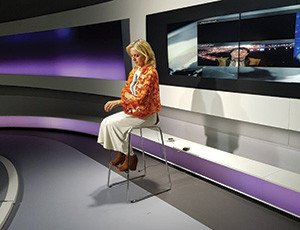
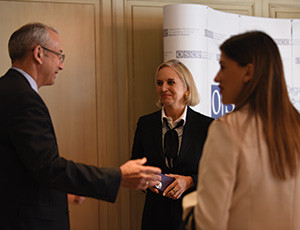
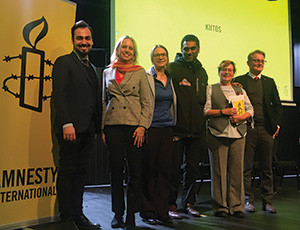
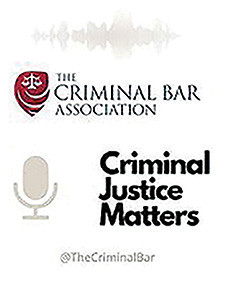
In Criminal Justice Matters, the CBA podcast series, Kirsty discusses the negotiations with the Ministry of Justice that ended criminal barristers’ indefinite action, and interviews key voices at the Criminal Bar. Read more here.

I used to balk at the idea of being on a ‘journey’. I still shy at its very concept, skittering into the undergrowth to avoid a road with signposts and crossroads. Perhaps if I mentally erase the road, I can poke at the body of my career at the Bar and throw out some thoughts from its tattered gown.
This leads me to the headline of being comfortable with who you are, with the sub-heading of lightly wearing badges of upbringing and remembering that they are reversible. My background is not one of financial privilege.
Both my parents started work at 15 years old. My dad worked on the factory floor as an apprentice in engineering. My mum worked as a sewist.
I remember one evening being given the responsibility of collecting her wages from her employer. I can recall the man through my eight-year-old eyes. He wore a thick gold chain and seemed to have a flash car. He told me he had deducted my mum’s wages as a zip was not straight. Zips were paid about 30 pence better than hems. It seemed a precious item. I remember looking at the neat stiches marching alongside the metal. There was no flaw. It all seemed unfair.
I probably absorbed a helplessness from my paternal grandmother whose hand was doubled back due to a botched hospital strapping of the wrist she broke as a child. In all our old photographs, she hides it under a coat. She was stung by her own perceived deformity. I listened to the stories of the poor health of my grandfathers from factories and mines. I saw how hard they worked.
I threw myself into petitioning against the clubbing of seals and harpooning of whales. I thought I could help the animals, if not the people.
Education was valued in our home as the shiny, clean steps into a profession. Career advice was limited to choices of medicine or law with a university degree spreading the sparkle. I read law at Birmingham University.
In my second year, I entered the Law Faculty Mooting Competition. The final was judged by Sir Stephen Brown LJ, former President of the Family Division and the winner was awarded by Lord Goff at a formal dinner. The competition was dominated by guys who oozed self-assurance, coated and dipped in a protective layer of class privilege. I felt my outsider shadow bouncing alongside me as I clutched the lectern. When I won, I was presented with a cup and a sprinkle of self-belief.
I remained drawn to those in vulnerable positions. Each year, a group of us fundraised and took deprived children from Inner City Birmingham, on holiday. The children were selected by social workers. They were wonderful and tragic, and our eyes glistened when we took them home, arranging to see them again.
Lancashire Local Authority provided my grant through university and through the Bar Course. Gray’s Inn awarded me a scholarship and the securing of a pupillage and grant at 2 Crown Office Row (now Lyttleton Chambers) meant that I was on my way to becoming a barrister.
I was called to the Bar in 1991 and, against all advice, deferred my pupillage for a year and strode out backpacking around the world, hustling, hitch-hiking and exploring countries whose existence I had only ever traced in photographs. I stocked up on Meatloaf cassettes from the street markets of Bangkok and sang along to ‘Heaven Can Wait’ while roaming like a bat out of hell.
In 1993, on completion of pupillage, I was offered tenancy at a small common law set of chambers. I had 18 enjoyable months as a tenant before the Head of Chambers left. Others followed and the chambers quickly and neatly folded. I became a squatter. I sucked the word of its negativity with my busy common law practice. I enjoyed catching the words of my opponent and dropping them onto my bonfire of their vanities. I usually was underestimated and experienced sexism and judicial bullying. I also found the friendships and support, from barristers, judges and solicitors that cushioned each fall. Above all, I was a successful lawyer.
One day, the prosecutor in my trial, Phillip Matthews (subsequently HHJ Matthews) suggested that I applied to his set of chambers, Francis Taylor Building. I did and was offered tenancy. It was another beginning, although there was no pause in my travelling. After around five years, the set decided that it wanted to change direction and stop criminal work. Not willing to give up on crime, a group of us moved together to 187 Fleet Street. In 2006, I spent two months in Jamaica working on the resentencing of people on death row. One prisoner proudly showed off a model that was made of matchsticks. I admired it while a neon light flickered, and a guard laughed.
Increasingly, I was working with barristers at Doughty Street Chambers. In 2009, Geoffrey Robertson KC, who was leading me at the time, suggested that I join Doughty Street. I did so after a meeting with an impressive barrister called Keir Starmer KC. I was sad to leave 187 but happy to keep the friendships.
I always wanted to add value and make change. I barrelled into Bar politics, protesting at the dismal levels of legal aid paid to juniors and setting up a representative body for the Young Bar. I became a young spokesperson for the Bar and for a decade would pop up on the small screen on chat shows and in print. I wrote my first media article for The Times and became one of its twice-yearly book reviewers. I was elected to the Criminal Bar Association (CBA) Executive for seven years and enjoyed drafting responses to consultations, analysing the additional crimes being added to the legislation jungle, while probation officers at court were strangled of resources.
In 2011, I was appointed silk. I telephoned my mum and we cried. My dad said that I had done well; a northern equivalent of performing cartwheels. The messages of congratulations from judges, barristers and solicitors sit alongside the mooting cup in the pockets of my mind.
I was elected to the Bar Human Rights Committee for 15 years and in 2012 was elected its first female Chair. I served for six years with an Executive that selflessly gave their time to intervene in unfair trials, write letters of concern over political prisoners and join my teams of barristers training UNICEF’s Child Protection Networks in child rights in Nigeria, evidence gathering on torture in Sri Lanka and fact finding in refugee camps.
I stitched travel and law together in my human rights practice and learnt new languages and dance around the edges. In Colombia, a fact-finding of extra-judicial killings shapeshifted into over a decade’s human rights work and conflict resolution.
San José de Apartadó peace community is a group of Cacao farmers who resisted displacement in 1997. On 21 February 2005, paramilitaries and the Colombian army collaborated to massacre the community’s leader and seven others, including three children. The community cut dialogue with the Colombian State and became emblematic of the suffering of the 52-year-old conflict. I met the community in 2012 and they agreed that I could open talks with the Colombian government over a Constitutional Court Order which had ordered reparations by the Colombian government.
I had a meeting with former President Santos on 29 November 2013 at the Presidential Palace in Bogotá. I requested a public apology for former President Uribe’s stigmatisation of the community immediately after the massacre. He had labelled them as FARC [Fuerzas Armadas Revolucionarias de Colombia]. President Santos apologised to the community on 10 December 2013. The words travelled to me as I was walking to defend in a gangland shooting trial at the Old Bailey: ‘I ask for forgiveness. And I do so with the knowledge that forgiveness is a condition for peace, and that peace is the only guarantor that there will be no more victims.’
In 2022 I was elected Chair of the CBA. My term as Chair commenced with implementing a ballot of a full walk-out of barristers from the courts. I stood alongside our juniors and silks outside the courts of Manchester, Liverpool, Preston, the Supreme Court and the High Court. It was a time of strength and stress and support, including from our solicitor colleagues.
I opened negotiations with former Lord Chancellor Brandon Lewis, working with others, and recommended a deal to the membership. On 10 October 2022, the CBA voted for the government’s offer of a 15% increase on backlog and commitment of an additional £7 million to other parts of the legal aid scheme during the spending review period. The impact assessment in 2023 placed the increase at 17%.
The vote was carried by juniors and seniors in fairly even number. Dominic Raab MP returned as Lord Chancellor just over two weeks later. He was clear that he would never have agreed to the deal. However, he agreed to honour it.
By May 2023, prosecution fees increases were implemented. We worked on increasing pay in the Magistrates’ Courts and increasing the use of Certificates for Assigned Advocates in the Youth Courts with success. Additional funding is coming into the Youth Courts in April 2024.
As the recent judicial review by the Law Society punches plain, the criminal justice system remains starved and neglected and the Criminal Legal Aid Advisory Board is required to do heavy lifting which can only succeed with additional money.
I left my position with another increase in train for s 28 recordings, which came into force in autumn 2023.
I hover over my time as Chair of the CBA as I continue to be asked about it daily in the robing rooms. Just before the opening of the ballot, many witnessed a toxic seam in the Criminal Bar. I also was handed buckets full of kindness from across the legal profession, which washed it away.
Criminal barristers made history through their action for the criminal justice system. It was successful with a smash and grab deal. When their action is taught and reflected on, they will inspire.
In 2021, I was appointed a Deputy High Court Judge and in 2022 I was appointed a Recorder. I am a Bencher of Gray’s Inn and have just completed three years on its management committee. I also am in my third year as trustee of the World Wildlife Fund; the seal pups were never very far away. In 2024, a typical day involves defending in a murder or terrorism trial, carrying out Child Rights training as a consultant to UNICEF in Myanmar, speaking on Parliamentary Select Committees and on panels on the crime of aggression in Ukraine or at the United Nations on accountability for the 1988 massacre in Iran. I remain a trainer and mentor for the Young Bar and represent Gray’s Inn on the Bar Council.
What Bar life learning can I share? It feels presumptuous, but maybe it is that we all stumble and fall and that this isn’t failure but is part of travel. Ask for help and remember those who are kind and pass it on. Keep the ladder down and the hand outstretched.
The profession is the barristers who weave words and law with skill underpinned with thoroughness and fairness. Where there is passion, it should not be overrun by ego. Keep intellectually curious and remember that preparation provides the depth to the spotlight.
Find what you love, find the people you love and look after them. Take advice but don’t let it paralyse you. Walk in the shoes of your clients and families but remember to kick off those shoes and not lose the core of yourself.
Criminal law and international human rights law will never provide the financial riches of those who work in commercial law or banks. However, there are opportunities to light fires that cast unfairness into the shadows. We just have to keep the spark.















In Criminal Justice Matters, the CBA podcast series, Kirsty discusses the negotiations with the Ministry of Justice that ended criminal barristers’ indefinite action, and interviews key voices at the Criminal Bar. Read more here.


Now is the time to tackle inappropriate behaviour at the Bar as well as extend our reach and collaboration with organisations and individuals at home and abroad
A comparison – Dan Monaghan, Head of DWF Chambers, invites two viewpoints
And if not, why not? asks Louise Crush of Westgate Wealth Management
Marie Law, Head of Toxicology at AlphaBiolabs, discusses the many benefits of oral fluid drug testing for child welfare and protection matters
To mark International Women’s Day, Louise Crush of Westgate Wealth Management looks at how financial planning can help bridge the gap
Casey Randall of AlphaBiolabs answers some of the most common questions regarding relationship DNA testing for court
Maria Scotland and Niamh Wilkie report from the Bar Council’s 2024 visit to the United Arab Emirates exploring practice development opportunities for the England and Wales family Bar
Marking Neurodiversity Week 2025, an anonymous barrister shares the revelations and emotions from a mid-career diagnosis with a view to encouraging others to find out more
David Wurtzel analyses the outcome of the 2024 silk competition and how it compares with previous years, revealing some striking trends and home truths for the profession
Save for some high-flyers and those who can become commercial arbitrators, it is generally a question of all or nothing but that does not mean moving from hero to zero, says Andrew Hillier